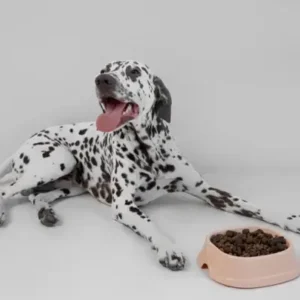The Symptoms of Grape Toxicity in Dogs
Acute symptoms of grape toxicity typically appear within 24 hours of ingestion. Severe symptoms, associated with kidney failure, usually become evident 24 to 48 hours after consumption.
Additional signs of grape poisoning include:
- Vomiting
- Diarrhea
- Polyuria (increased urination)
- Polydipsia (excessive drinking)
- Anuria (no urination)
- Oliguria (decreased urination)
- Anorexia (loss of appetite)
- Lethargy
- Dehydration
- Halitosis (bad breath)
If your dog exhibits any of these signs after consuming grapes, contact a veterinarian right away. Early intervention can make a significant difference in your dog’s recovery.
Can All Dogs Be Affected by Grapes?
Interestingly, not all dog breeds show symptoms of toxicity after eating grapes. While some dogs may consume grapes without immediate adverse effects, others may develop severe reactions, even from a small amount.
The varying sensitivity levels among dogs mean there’s no way to predict whether your pet will be affected. Generally, it’s best to avoid feeding grapes altogether to prevent the risk of poisoning.
Can a Single Grape Kill a Dog?
Unfortunately, a single grape (or raisin) can potentially kill a dog, although not all dogs are affected the same way. Some dogs can eat grapes without symptoms, but others may have severe reactions, even from a single grape.
The exact cause of the toxicity remains unknown, but it can lead to kidney failure, which can be fatal if not treated promptly.
If a dog consumes a grape, it’s important to contact a veterinarian immediately, even if they don’t show symptoms right away. Early intervention can help prevent severe outcomes and increase the chances of recovery.
What Should You Do if Your Dog Eats Grapes?
If your dog eats even a single grape or raisin, contact your veterinarian or the Pet Poison Helpline at 855-764-7661 immediately. In most cases, you’ll be advised to bring your dog to the vet for an in-person examination and treatment.
- Contact your veterinarian immediately. If it’s after hours, take your dog to an emergency clinic.
- Induce vomiting if instructed by your vet. This is crucial in the early stages to prevent further absorption of toxins.
- Follow your vet’s instructions for treatment, which may include intravenous fluids to flush the toxins out and monitor kidney function.
The earlier you intervene, the better the chances are for your dog’s recovery.
Alternatives to Grapes for Dog Treats
While grapes should never be given to dogs, there are plenty of other tasty, safe fruits your dog can enjoy.
Consider these healthy alternatives that your dog can eat:
- Apples (without seeds): Rich in fiber and vitamin C, apples are a safe and delicious treat for dogs.
- Bananas: Packed with potassium, bananas are an excellent snack for dogs, but should be given in moderation.
- Blueberries: These small, antioxidant-rich fruits are perfect for training or as an occasional treat.
These fruits provide nutritional benefits without the risks associated with grapes.








